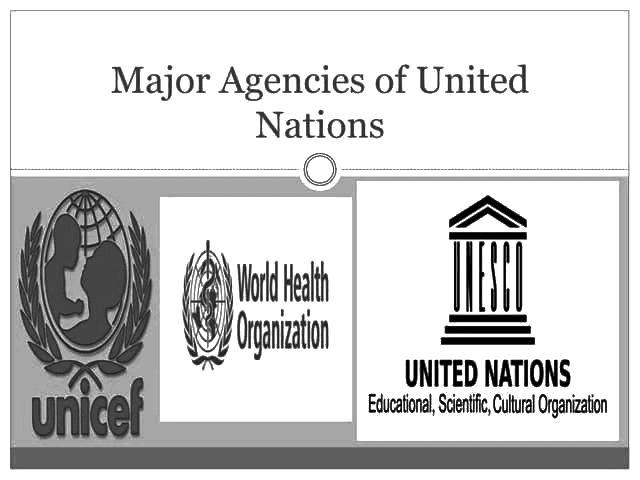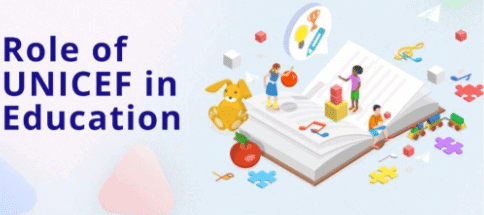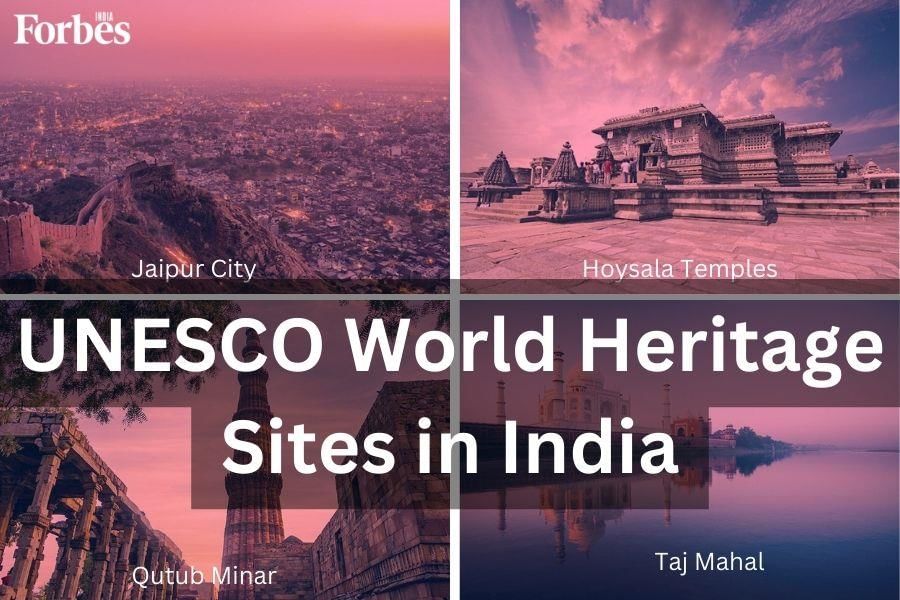Revision Notes: Major Agencies of the United Nations | History and Civics Class 10 ICSE PDF Download
Major Agencies of the United Nations

The United Nations has several specialized agencies that work to improve the social and economic conditions of countries.
United Nations Children’s Fund (UNICEF)
- The United Nations International Children’s Emergency Fund (UNICEF) was established by the UN General Assembly to assist children affected by the Second World War and to address the needs of children in post-war Europe. Over time, UNICEF expanded its focus to include the needs of children in all developing nations. Today, the agency is officially known as the United Nations Children’s Fund.
- UNICEF is headquartered in New York City and operates more than 200 offices in developing countries around the world.
- The agency relies on voluntary contributions from governments, donations from private organizations, the sale of greeting cards, and various fundraising activities to support its work.
- The primary objective of UNICEF is to promote the welfare of children, particularly in developing countries. This is achieved by providing low-cost, community-based services in areas such as child health, nutrition, and vaccination.
Functions of UNICEF
- Protection and Well-Being: UNICEF is dedicated to safeguarding children who are facing survival challenges, health issues, and ensuring their overall well-being.
- Essential Services: The organization provides essential services in areas such as primary health care, nutrition, basic education, and sanitation, particularly in developing countries.
- Capacity Building: UNICEF funds the training of health and sanitation workers, teachers, and nutritionists to improve local capacities.
- Educational Supplies: The organization supplies technical materials and stationery related to education, including paper and textbooks.
- Emergency Assistance: During emergencies caused by natural disasters, civil conflicts, or epidemics, UNICEF offers crucial support to affected children.
- Disease Prevention: UNICEF takes proactive measures to prevent diseases such as tuberculosis, malaria, and various skin disorders.
- Advocacy and Rights: The organization advocates for children's rights, upholding the Convention on the Rights of the Child and working towards its implementation.
UNICEF Programmes in India

UNICEF has been instrumental in launching several significant programs in India, including:
- National Mission for Drinking Water: UNICEF assisted the Indian government in launching this mission to ensure safe and adequate drinking water for all.
- National Literacy Mission: With UNICEF's support, this mission was initiated to improve literacy rates across the country.
- Community Development Programmes: UNICEF has facilitated various community development initiatives in rural areas to enhance living standards and promote sustainable development.
- Oral Rehydration Therapy (ORT): To combat high infant and child mortality rates due to diarrheal diseases, the Indian government, with UNICEF's assistance, promoted the production and use of ORT.
- Iodised Salt Promotion: UNICEF collaborated with the Indian government to promote iodised salt to prevent iodine deficiency disorders, which can lead to severe health issues.
- Rural Water Supply Programme: UNICEF and the Indian government have been working together to accelerate the rural water supply programme, ensuring access to safe drinking water in rural areas.
World Health Organization (WHO)
The World Health Organization (WHO) is a specialized health agency within the United Nations. Every year, on April 7, World Health Day is celebrated to raise awareness about global health issues.
The primary goal of WHO is to assist individuals in achieving the highest possible level of health. The organization defines health as a state of complete physical, mental, and social well-being, rather than merely the absence of disease or illness. WHO's headquarters is situated in Geneva, Switzerland.
Functions of WHO
- Improving Health Systems: WHO helps countries enhance their health systems by ensuring the quality of services provided to individuals and communities.
- Providing Essential Medicines: The organization supplies crucial drugs and medicines needed for various medical purposes.
- Immunization Programs: WHO has initiated significant programs to vaccinate children against diseases such as measles, diphtheria, tetanus, tuberculosis, polio, and whooping cough.
- Promoting Research: The organization encourages research aimed at discovering cures and preventive measures for diseases.
- Ensuring Safe Drinking Water: WHO works towards providing access to safe drinking water, a critical component of public health.
- Disease Prevention: The organization focuses on combating diseases and preventing their spread, with particular attention to diarrheal diseases affecting infants and young children.
United Nations Educational, Scientific and Cultural Organization (UNESCO)
The United Nations Educational, Scientific and Cultural Organization (UNESCO) was established on November 4, 1946. UNESCO aims to promote global peace and security by fostering cooperation among nations through education, science, and cultural exchange. The organization is headquartered in Paris, France.
Functions of UNESCO in Education
- Eradication of Illiteracy: UNESCO works to eliminate illiteracy by promoting distance education and open school systems.
- Education for Women and Girls: The organization emphasizes the importance of educating women and girls.
- Education for Disabled Children: UNESCO finances the education of children with disabilities.
- Grants and Fellowships: UNESCO provides grants and fellowships to teachers and scholars, promoting international understanding through education.
- Book Fairs and Festivals: The organization organizes book fairs and festivals at national and international levels.
- Education for International Understanding: UNESCO promotes education as a means for fostering international understanding.
Functions of UNESCO in Science and Scientific Activities
- Organization of Seminars and Conferences: UNESCO organizes seminars and conferences for scientists to share knowledge and research.
- Promotion of Research Studies: The organization promotes research studies in various fields such as Geology, Mathematics, Physics, and Oceanography.
- Encouragement of Social Sciences: UNESCO encourages the study of social sciences to address and combat all forms of discrimination.
- Correction of Imbalance in Scientific Manpower: The organization works to correct imbalances in existing scientific and technological manpower.
Functions of UNESCO in Communication
- Assists developing and underdeveloped countries in enhancing their communication systems.
- Enhances the quality of the press, films, and video production.
- Advocates for the freedom of the press and media.
Preservation of Cultural Heritage

- Provides financial support, technical advice, and equipment for the preservation of monuments and important works of art.
- Encourages artistic creations in literature and fine arts.
- Promotes cultural development through fine arts.
- Sends cultural missions to various countries to foster peace and prosperity.
India’s Association with UNESCO

- India has been a member of UNESCO since its inception in 1946.
- In 1949, the Indian government set up a National Commission for Cooperation with UNESCO, comprising five sub-committees: Education, Social Sciences, Natural Sciences, Culture, and Communication.
- The National Commission promotes UNESCO’s programmes and facilitates Indian participation in international conferences, seminars, and workshops organized by UNESCO.
- UNESCO provides funding and expert services for the protection and maintenance of several historical monuments in India, including the Taj Mahal.
|
30 videos|197 docs|28 tests
|
FAQs on Revision Notes: Major Agencies of the United Nations - History and Civics Class 10 ICSE
| 1. What is the primary purpose of UNICEF? |  |
| 2. How does the World Health Organization (WHO) contribute to global health? |  |
| 3. What role does UNESCO play in promoting education? |  |
| 4. How has India contributed to UNESCO's mission? |  |
| 5. What are some key achievements of the WHO in recent years? |  |
















